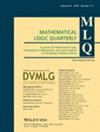美好的ℵ1个生成的非P点,第一部分
IF 0.4
4区 数学
Q4 LOGIC
引用次数: 0
摘要
我们在N${\mathbb{N}}$上定义了一个非主超滤子族,在某种意义上,它们离P点很远。我们在合理的条件下证明了这种超滤子的存在。在随后的文章中,我们打算证明这样的超滤器可能存在,而不存在P点。尽管我们的主要动机来自强迫和独立结果,但从组合的角度来看,这里介绍的超滤器家族也应该很有趣。本文章由计算机程序翻译,如有差异,请以英文原文为准。
Nice ℵ1 generated non-P-points, Part I
We define a family of non-principal ultrafilters on which are, in a sense, very far from P-points. We prove the existence of such ultrafilters under reasonable conditions. In subsequent articles, we intend to prove that such ultrafilters may exist while no P-point exists. Though our primary motivations came from forcing and independence results, the family of ultrafilters introduced here should be interesting from combinatorial point of view too.
求助全文
通过发布文献求助,成功后即可免费获取论文全文。
去求助
来源期刊
CiteScore
0.60
自引率
0.00%
发文量
49
审稿时长
>12 weeks
期刊介绍:
Mathematical Logic Quarterly publishes original contributions on mathematical logic and foundations of mathematics and related areas, such as general logic, model theory, recursion theory, set theory, proof theory and constructive mathematics, algebraic logic, nonstandard models, and logical aspects of theoretical computer science.

 求助内容:
求助内容: 应助结果提醒方式:
应助结果提醒方式:


